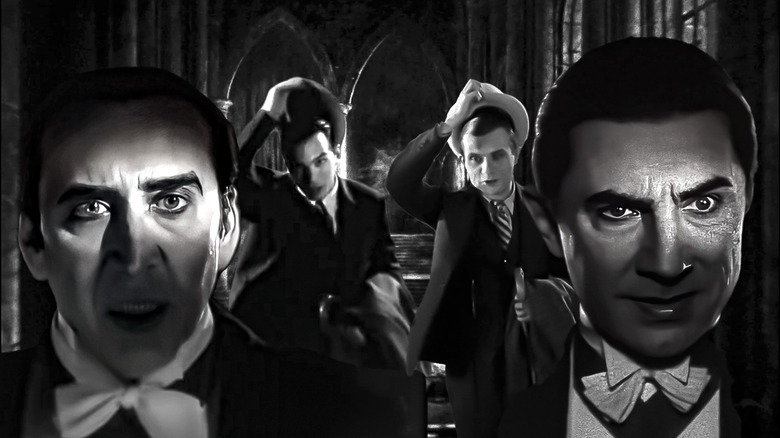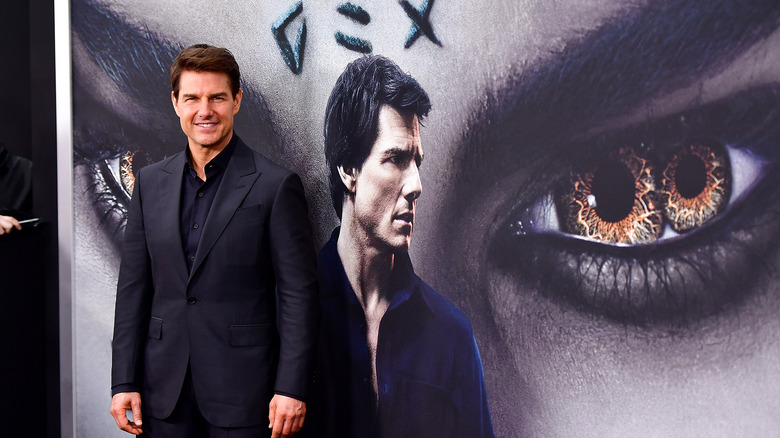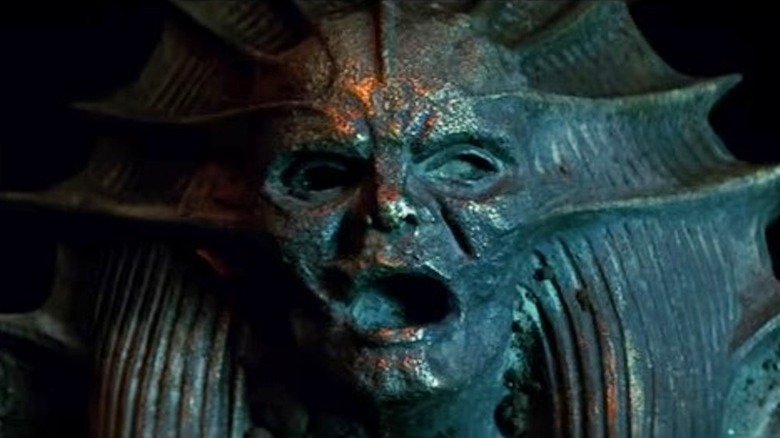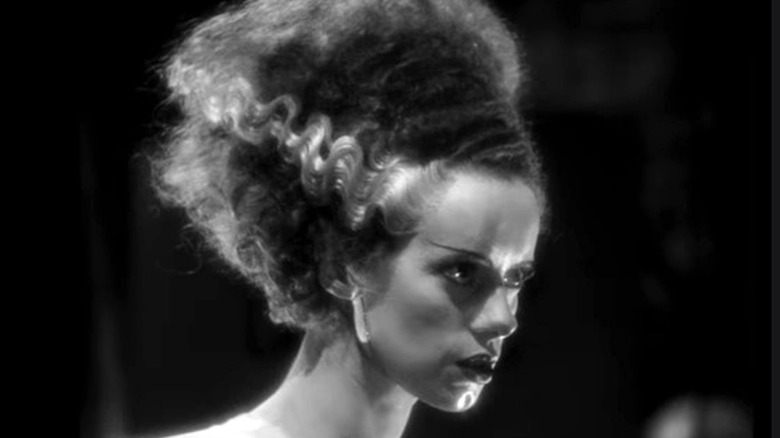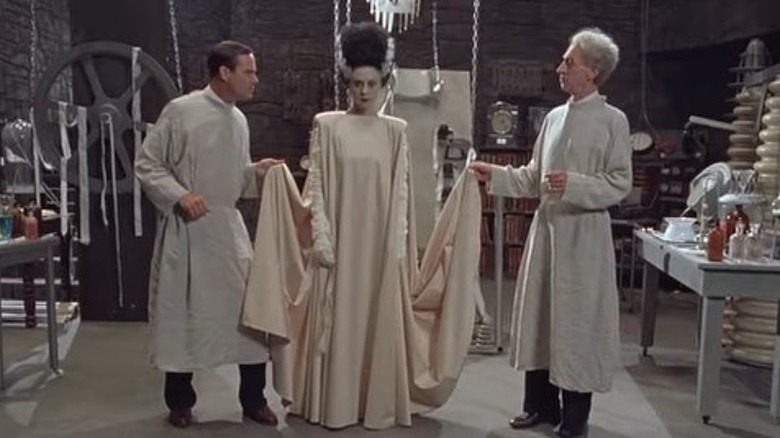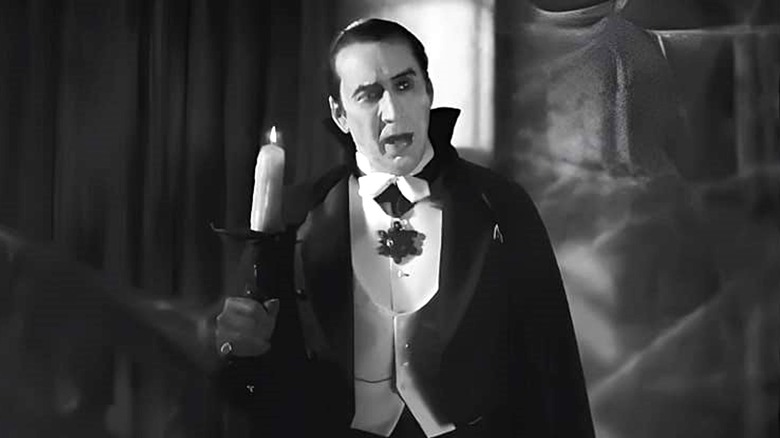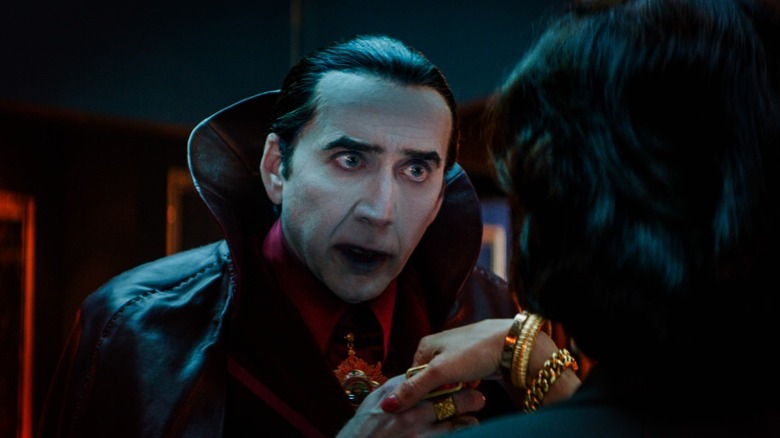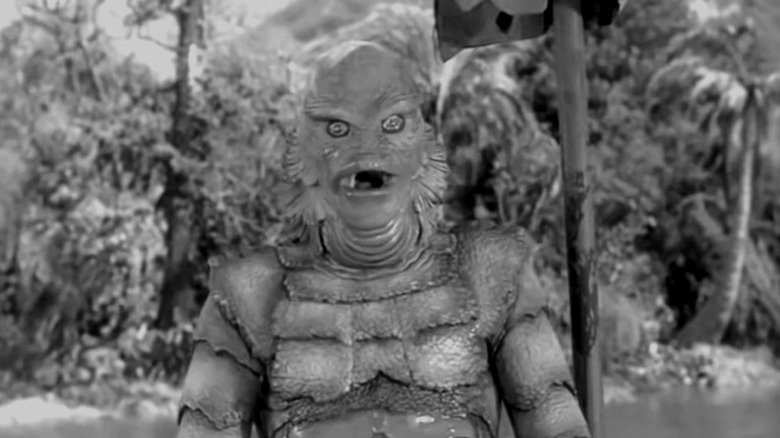Renfield Proves If Universal Wants A Dark Universe Reboot, Nostalgia - Not Modernization - Is The Ticket
With the release of the Universal Pictures horror-comedy "Renfield" — starring Nicholas Hoult in the title role and Nicolas Cage as Count Dracula — fans of the studio's legendary Universal Monsters are experiencing a bit of a fright, but not the scares you expect to see with this classic brand. Instead, the fear is over the modern day setting of "Renfield," and whether Universal has learned that the idea of rebooting its classic IP with films set in the present — instead of keeping them as period films — simply doesn't work.
Consider Universal's Dark Universe, which began — and unceremoniously ended — with an ill-fated reboot of "The Mummy" in 2017. Fashioned as a Tom Cruise vehicle where the period settings of the 1932 original and 1999 Brendan Fraser update were both sidelined for a modern-day interpretation, the film felt more like "Mission: Impossible" than either the atmospheric original or its adventurous remake. Simply put, "The Mummy" was a huge gamble and its big loss at the box office was a crushing blow to the Universal Monsters franchise, especially considering Cruise — arguably one of the last huge action stars in the world — couldn't even save it.
Six years later, will "Renfield" — which has a relatively modest production budget of $86 million — get wrapped up in the same mistakes as its mummified predecessor, and bury the prospects for more Universal Monsters films for good? When the first trailer dropped, this seemed like a real possibility.
Maybe not, though. Because in reality, the film is a surprisingly loving ode to its 1931 predecessor, the Bela Lugosi-starring "Dracula." And maybe, if Universal continues this trend, the studio will realize that leaning into nostalgia, instead of quivering away from it, is the ticket to rebuilding the Universal Monsters brand.
The rise of the Dark Universe should've been great, but The Mummy ruined it
Universal's Dark Universe was an ambitious shared universe concept, headlined by such A-list stars as Tom Cruise and Johnny Depp. Universal was so certain of its staying power that it famously issued a PR blast with a photo of Cruise, Depp, Russell Crowe, Javier Bardem, and Sofia Boutella. Oddly, though, the video accompanying the announcement featured clips from Universal's most iconic monster movies, which essentially set up fans of the classics for a .... well, monstrous disappointment, because the whole idea was to reimagine these monsters in new forms instead of harkening back to the old ones.
Dark Universe architects were trying to replicate the success of the Marvel Cinematic Universe, by connecting all of the famous monsters' stories together, with the one constant being Russell Crowe's Dr. Jekyll. Cruise, playing adventurer Nick Morton opposite Boutella's Ahmanet (aka the Mummy), kicked off the Dark Universe (along with Crowe's Jekyll) in "The Mummy." "The Bride of Frankenstein," with Bardem set to play Frankenstein's Monster opposite a yet-to-be-determined actor for the title character, was scheduled to be next. From there, Depp was hired to assume the lead role in "The Invisible Man" (years later, producer Jason Blum successfully produced a low-budget remake of Universal's "The Invisible Man" in a modern setting in 2020, but that was unconnected).
The excitement, however, quickly waned with the release of Cruise's and Boutella's "The Mummy," because the film's modernization attempts made fans feel estranged from the property, instead of welcomed to it.
The reimagined Universal Monsters universe quickly cut to black
Even though it pulled in a seemingly respectable $409 million at the global box office, the final returns of "The Mummy" weren't enough to justify another Dark Universe film. The film cost $195 million to produce, with an additional $150 million going to distribution and marketing. By the end, Deadline estimated the film would lose $95 million when all was said and done. Fortunately for the production, it earned $34 million more than this early estimate, so it ended an approximate $61 million in the red.
To studios, obviously, the bottom line is what matters most. To fans of a property, though, what matters is when a studio pulls the classic bait-and-switch on them. Sure, there was the "reimaging" forewarning by filmmakers Chris Morgan and Alex Kurtzman, but even so, it came as a shock that "The Mummy" was the exact opposite of the period films highlighted throughout the Dark Universe promotional trailer. Quite simply, Universal Monsters fans still love the classic films because they take viewers back to a different time and place. The black and white visuals lend a dreamlike — or nightmarish, depending on your point of view — quality to it all. No matter how fans interpret the films, they're forever etched in the memories of Baby Boomers and Generation Xers, who in turn shared their love of the classics with their children and eventually, their grandchildren.
There's a reason costumes of Universal's classic monsters are still prominent on the racks every Halloween, and the brand remains a merchandising machine. With "The Mummy," Universal ignored its built-in fanbase, instead of giving people what they wanted.
The Dark Universe subverted monster fans' expectations
You don't have to closely follow entertainment news coverage to know that nostalgia is the driving force behind many new films and TV shows. Fans turned out in droves to see "The Super Mario Bros. Movie" in its opening weekend. Meanwhile, Warner Bros. announced in April 2023 that they're going to reboot "Harry Potter" whether fans want it or not.
In short, if studios have a built-in audience for their IPs, they have a reason to keep the material coming. The classic Universal Monsters brand has a devoted following, to the point where even rival studio Disney tapped into it when they released "Werewolf by Night" in 2022, a brilliantly conceived, brilliantly executed black and white streaming special, masterminded by composer-turned-director Michael Giacchino.
By going the modern route with its Dark Universe, though, Universal subverted audiences' expectations by using the power of nostalgia to hype their new creations and then not giving them what they paid tickets for. With "The Mummy," Universal didn't deliver the goods, particularly for audiences of the 50+ demographic, or the so-called "Monster Kids" who discovered Universal Monsters through local, late-night TV programming on Saturday nights in the 1960s and 1970s. This was the setting where horror hosts like Vampira, Svengoolie, and Elvira rose to prominence, and became part of the still-vibrant monster movie culture. It's hard to imagine such hosts in the future finding anything interesting to say about so-called monster movies like "The Mummy" with their drab modern settings.
Could Bill Condon's Bride of Frankenstein have saved the Dark Universe? Well...
After "The Mummy" unraveled, Universal shelved "The Bride of Frankenstein," which had Bill Condon slated to direct. Condon was an inspired choice — already well-versed in the source material as the director and Oscar-winning writer of "Gods and Monsters," which chronicled Universal Monsters director James Whale's (Ian McKellen) final days. While "Gods and Monsters" mostly examined Whale's personal life, the film also recreated a pivotal scene in the original "Bride of Frankenstein" where Elsa Lanchester's (Rosalind Ayers) Bride was brought to life, giving great hope to fans that Condon's "Bride" would embrace the period setting of its forebears.
Since the project was axed, no one outside of Condon's inner circle truly knows if his "Bride" was going to be set in the modern day. However, from what the filmmaker has revealed in interviews since, it certainly appears that way. After all, the screenplay was being written by David Koepp — the co-scribe of Cruise's "The Mummy" — and logic says if you want a (dark) universe where all your movies are connected, having the same writer on the films will make the process easier. In a 2017 interview with Collider, Condon more or less confirmed his "Bride" remake's modern-day setting, saying, "I keep thinking in a way this is at least a tribute to what Whale might have done if he'd made a third 'Frankenstein' movie and he'd done it in the 21st century."
If that's the case, perhaps it's best that this Bride of Frankenstein was kept under wraps. However, with the Dark Universe in the past, Universal's newest take on their monsters is "Renfield." And despite the contemporary wrapping paper of "Renfield," it appears that the film is actually an old-school present to classic fans.
Universal is bidding Dracula welcome again in Renfield
At the beginning of the project, "Renfield" seemed to solely be going the modern setting route, as evidenced by the release of its teaser trailer in January 2023. But the same day the trailer debuted online, Nicolas Cage revealed to Looper in an exclusive interview that the project was very keenly understanding the appeal of the Lugosi movie, even so far as hair and makeup. As Cage explained then, "There's an opening sequence [in "Renfield"] which homages the original film with Bela Lugosi."
Finally, it seems that Universal is giving fans at least a little bit of what they want. It could also be that director Chris McKay ("The LEGO Batman Movie") and producer Robert Kirkman ("The Walking Dead") are Monster Kids at heart, and so they perhaps used their clout to stand their ground. As for Cage's contribution, a TV spot for "Renfield" released in March held true to his promise of a Bela Lugosi "Dracula" homage, revealed to be a black and white recreation of the Count's first meeting with Renfield (Nicholas Hoult) at Dracula's castle in Transylvania.
This is expanded upon considerably in the final version of "Renfield," as a handful of famous scenes from the 1931 original are faithfully recreated by Cage and Hoult. Among the dialogue are legendary Dracula lines like, "I bid you ... welcome," and "I never drink ... wine." Fans who stay through the end credits are sure to be delighted by some color shots of Cage in his traditional, Bela Lugosi-like tux, as well.
Renfield brings the best of yesterday to today
While the homages to Bela Lugosi's Count Dracula and Dwight Frye's Renfield performances in "Dracula" are only a small part of "Renfield," the recreations of the classic moments from the original film shows how Universal is respecting the fan base by presenting at least part of the film in a period setting, and in black and white, no less. To a larger extent, though, the lifeblood of "Dracula" is flowing through the veins of "Renfield" because it logically continues their story — presenting a world where both Dracula and Renfield have survived the events of the original film, and showing where they would be today.
In this regard, "Renfield" is a sequel of sorts to the original "Dracula," rather than a reimagining. In a comedic yet relevant sort of way, it addresses how co-dependency issues and toxic relationships are quite likely for two people who are forced to deal with each other for 90 years.
Naturally, die-hard fans are bound to have issues with "Renfield" being a horror-comedy, since there's an equal dose of horror, gore, and laughs throughout. However, one must not forget that not only Lugosi, but another Universal Monsters luminary, Lon Chaney Jr., starred with comedy greats Bud Abbott and Lou Costello in the hilarious monster mash "Abbott and Costello Meet Frankenstein" in 1948, a great precursor to today's MCU crossovers. And while he didn't don his Frankenstein's monster makeup for the film, the eponymous star of "Abbott and Costello Meet the Killer Boris Karloff" appeared with the comedy duo a year later.
It's time for a new era of Universal Pictures monster movies
Whether Universal is playing their monsters for laughs or not, fans should take comfort in how "Renfield" embraces the period sensibilities of the 1931 film, and properly honors its legacy, instead of driving a stake in its heart the way that the Dark Universe tried to do with "The Mummy." By paying respectful homage to Bela Lugosi's Dracula in the film, Universal Pictures seems to have realized that there is indeed value in nostalgia, and those sensibilities will hopefully be a part of the Universal Monsters franchise's DNA, moving forward.
What's next? Since nostalgia is key, the studio should cast actors reminiscent of the original stars of its monster movies. While the film lost money at the box office, Universal actually had the right idea in mind with the 2010 period remake of "The Wolf Man," where Benicio Del Toro's Larry Talbot perfectly captured Lon Chaney Jr.'s inner turmoil. Meanwhile, if Nicolas Cage doesn't reprise Dracula in a sequel, maybe the charismatic Ralph Fiennes — with his menacing Lugosi-like stare — could play the next Prince of Darkness. Jeremy Irons remarkably resembles Boris Karloff, and he could easily step into the guise of either Frankenstein's Monster or the Mummy.
Perhaps "The Creature from the Black Lagoon" and its glorious Gill-Man, though, are best left alone. Several filmmakers — even James Gunn — have scrapped their attempts. If anybody dare tries again, getting the period setting right is only one part of the puzzle — perhaps even more important, in this case, is that a new film should not dare mess with Milicent Patrick's iconic Creature design. Monster movie fans, after all, want to be screaming for all the right reasons, not the wrong ones.
